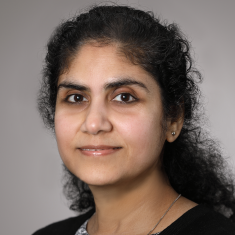
Lipika Ray, Ph.D.
- Center for Cancer Research
- National Cancer Institute
- Building 10, Room 1-5140
- Bethesda, MD 20892
- 240-858-3612
- lipika.ray@nih.gov
RESEARCH SUMMARY
Lipika Ray is a computational biologist working on cancer genomics, drug targets, and cancer therapeutics. She specializes in structural biology, bioinformatics and clinical genetic data analysis. Dr. Ray joined the Cancer Data Science Laboratory in June 2020.
Areas of Expertise

Lipika Ray, Ph.D.
Research
Lipika Ray (Pal) trained as a computational biologist and pursued her research career focusing on protein structural analysis, bioinformatics and genetics for complex diseases and monogenic diseases. She explored the complex disease mechanism landscape using Genome Wide Association Studies (GWAS) data, including seven-disease microarray data from the Wellcome Trust Case Control Consortium and she developed a machine learning model for prediction of complex disease risk, specifically for Crohn’s disease, using genotype and mutation data. She also designed and developed a search strategy and bioinformatics pipeline for causative variants from whole genome sequencing data for rare pediatric diseases, leading to a novel discovery of a variant for epileptic encephalopathy. Dr. Ray was an active participant in a community experimental platform for genome interpretation, Critical Assessment of Genome Interpretation (CAGI). She also served as an organizing editor for the CAGI5 special issue, published in the journal of Human Mutation.
At the National Cancer Institute, she has the privilege to work under the guidance of Dr. Eytan Ruppin, Chief, Cancer Data Science Laboratory to analyze cancer data. Here she is involved in translational research for cancer therapeutics and is also developing therapeutics for COVID-19.
Publications
- Bibliography Link
- View Dr. Ray's ORCID Bibliography.
Matching whole genomes to rare genetic disorders: Identification of potential causative variants using phenotype-weighted knowledge in the CAGI SickKids5 clinical genomes challenge
CAGI4 Crohn's exome challenge: Marker SNP versus exome variant models for assigning risk of Crohn disease
Genetic Basis of Common Human Disease: Insight into the Role of Missense SNPs from Genome-Wide Association Studies
Tracing the origin of functional and conserved domains in the human proteome: implications for protein evolution at the modular level
Sequence and structure patterns in proteins from an analysis of the shortest helices: implications for helix nucleation
Biography

Lipika Ray, Ph.D.
Lipika Ray (Pal) received her Ph.D. from Jadavpur University, India; her doctoral research on protein structural data analysis was conducted at Bose Institute (Kolkata, India). She pursued her post-doctoral work on protein structural studies in the Bioinformatics Center at Bose Institute and at the State University of New York (Albany, NY) where she focused on bioinformatics analysis of protein domains. Thereafter she joined the Institute for Bioscience and Biotechnology Research (IBBR, Rockville, MD), a joint research institute affiliated with the University of Maryland at College Park, the University of Maryland, Baltimore, and the National Institute of Standards and Technology. At IBBR, Dr. Ray joined Prof. John Moult's group as a Research Associate and continued her work as Assistant Research Scientist. In the Moult group, she explored the complex disease mechanism landscape using Genome Wide Association Study (GWAS) data and developed a machine learning model for prediction of complex disease risk. She also served as the Organizing Editor for the Human Mutation special issue of the Fifth Round of Critical Assessment of Genome Interpretation. Dr. Ray also volunteered at the Rare Genomics Institute as a data analyst for rare pediatric diseases.
Dr. Ray received her B.Sc. and M.Sc. in Chemistry from the University of Calcutta, India, and then pursued her career from Ph.D. onwards as a computational biologist, structural biologist, bioinformatics analyst and geneticist. She is currently applying all this knowledge to pursue translational research on cancer therapeutics at the Cancer Data Science Laboratory, Center for Cancer Research, National Cancer Institute.
